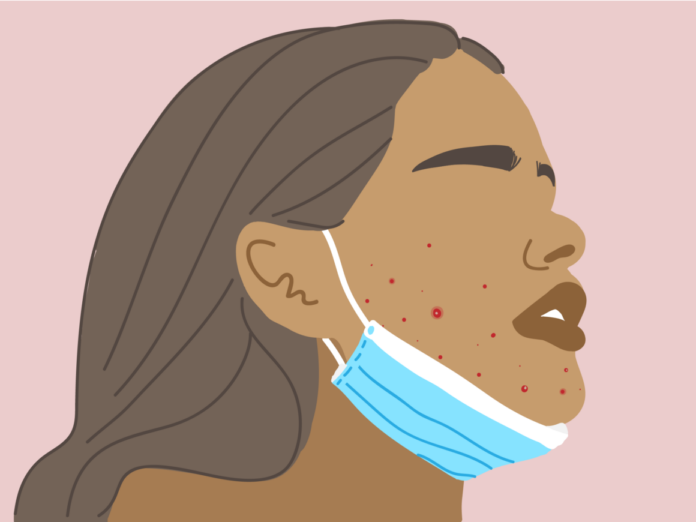The COVID-19 pandemic has brought its fair share of woes for us all. Besides the more talked about medical issues, many folks are now also dealing with acne mechanica or “maskne,” a skin condition brought on by the prolonged wearing of face masks.
Even though face masks are a dire necessity to keep the coronavirus at bay, they can cause heat, the clogging of pores, and friction that when combined with a moist environment from breathing, talking or sweating can develop into skin flare-ups.
How can you protect your skin from developing maskne or other skin issues?
Wash your face. Never, ever, put a mask on a dirty face! The dirt and oil that is on an unclean face will get trapped under the mask and cause breakouts. Always choose a gentle cleanser that is free of harsh chemicals. Rinse your skin with lukewarm water and pat dry. Never scrub or rub your face beforehand.
Avoid wearing makeup. Try to refrain from wearing makeup under a mask. Masks tend to trap makeup on the skin and this can lead to clogged pores and breakouts. Besides, makeup on masks is not a pretty picture.
Use a good moisturizer. Moisturizers act as barriers to the friction caused by masks. Select a good moisturizer that is oil-free and fragrance-free. Be on the lookout for ingredients that protect the skin like ceramide and hyaluronic acid. Steer clear of heavily scented and greasy products that will only lead to acne.
Stick to clean masks only! Masks are contaminated with bacteria, viruses, and fungi, a microbial menagerie! It is important to keep a clean, rotational, and steady supply of masks on hand. According to Dr. Thivi Maruthappu, M.D., a consultant dermatologist at Highgate hospital and spokesperson for the British Skin Foundation, “I would recommend washing your face mask on a daily basis if you’re wearing it every day. Soft fabrics such as cotton are less likely to cause friction than synthetic fibers like polyester.” Washing a fabric mask in hot water is also best.
Redness or swelling? If your face is red or swollen after removing your mask, icing the skin can bring relief and lessen the irritation. Try applying ice cubes or a pack of frozen veggies for a few minutes at a time to the affected area. Follow the icing with an OTC hydrocortisone cream, of about 1% and use only as needed. Never wear a mask over the hydrocortisone cream as it will intensify the affected area.
Dry skin, itch without rash, and peeling skin? If you’re experiencing dry or peeling skin after wearing a mask for long periods of time, wash your face with gentle cleansers. Pat your face dry, gently leaving some moisture on the skin, then apply a heavy moisturizing cream to rehydrate your skin.
Avoid harsh facial meds. If you are using products like retinol or benzoyl peroxide they will irritate the skin more when covered by a mask. If you are wearing a mask for prolonged periods of time, use less of the meds or refrain from using them at all while masked.











